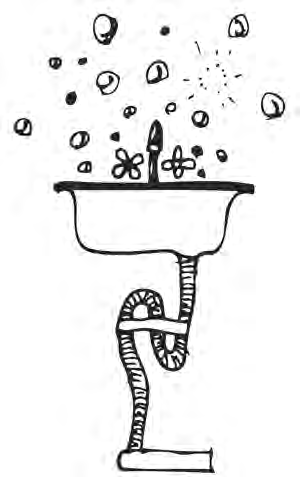100 Perks of Having Cancer: Plus 100 Health Tips for Surviving It (22 page)
Read 100 Perks of Having Cancer: Plus 100 Health Tips for Surviving It Online
Authors: Florence Strang
Tags: #Health; Fitness & Dieting, #Diseases & Physical Ailments, #Internal Medicine, #Oncology, #Cancer, #Medicine & Health Sciences, #Clinical, #Medical Books, #Alternative Medicine, #Medicine



Perk #19
An Excuse to Escape Dish Duty
W
hile I love big family dinners, I hate the
cleanup afterward. I hate it so much, in fact,
that I have earned myself the nickname “Eat and
Run.” I don’t pride myself on being afflicted with
the eat-and-run syndrome, but when that turkey
coma kicks in, I fall victim. As I shamefacedly
slept off those extra calories, I am sure that snide
remarks were being made behind my back about
my dirty-dish avoidance. But that was before
cancer. Even when I half-heartedly offered to
help with the dishes after my diagnosis, I just
got shooed away to a welcoming couch. I almost
felt sorry for my sister, Sherry, one Sunday when she hinted about her
hysterectomy in an attempt to escape dish duty. But, hey, by that time, it
had been seven weeks since her surgery; she’d milked that baby for all it
was worth! Now me, on the other hand, I figured I could probably get
another year out of my situation if I played my cards right. Christmas dinner
at Mom’s that year was never so relaxing.
Cancer gives you a ready-made excuse to avoid dish duty.
HEALTH TIP #19
Need Another Excuse? Think About the Toxins
A
re you sick of loading and unloading the dishwasher? Well the truth is,
it might be the dish soap that’s making you sick. The chemicals in your
dish soap may get your dishes squeaky clean, but do you really need toxic
I 82 J

Perk #19: An Excuse to Escape Dish Duty
83
chemicals to do the job? Whether you are washing the dishes by hand or
loading them into a dishwasher, the dishwashing product you use may con-
tain substances that are harmful to your health. Here are three of the most
common and the most dangerous toxins found in dish detergent:
Triclosan
Triclosan is a chemical antibacterial agent that is widely used in dish deter-
gent and hand soap as well as children’s toys, clothing, deodorants, and
even toothpaste. This “germ fighter” may be killing more than just unwanted
bacteria. Triclosan is absorbed through the skin and remains in your body
for up to twelve hours. There is evidence that triclosan can find its way to
your fat cells where it can accumulate and interfere with the body’s thyroid
metabolism. (Your thyroid regulates a multitude of body functions.) Even
the American Medical Association issued a statement at their annual meet-
ing that “the use of common antimicrobials (triclosan) . . . as ingredients
in consumer products should be discontinued.” It is noted to be a highly
potent allergen, causing dermatitis and worsening asthma. Triclosan is also
among over 200 chemicals found in umbilical cord blood of newborns in
the United States.
In 2012, the U.S. Environmental Protection
Agency (EPA) began studying the harmful effects of
triclosan due to excessive reports of toxic side effects
and growing research that cite hormone related
effects especially to the thyroid gland. They plan to
review the registration process for this chemical (to
possibly reclassify it as harmful) in 2013, but it may
not be until 2015 until this is completed.
Triclosan is also devastating to the environ-
ment. As it washes out from the drains into the
water systems, it destroys the bacteria that main-
tains the delicate biological balance of rivers, lakes,
and streams, and kills fish and other vital water
plants. It also reacts with the chlorine as it goes
through the water treatment facilities and forms
84
100 Perks of Having Cancer
new cancer-causing compounds as it comes into your home and out of your
faucets. Because of this, many governmental water-management agencies are
calling for widespread reductions in public triclosan use. In March 2013,
Minnesota announced that their state agencies will no longer purchase any
products containing triclosan.
Yes, you don’t want germs on your dishes, but using plain ol’ soap with-
out the fancy chemical germinators kills them just as effectively.
Bleach
Chlorine bleach is found in most automatic dishwashing detergents, but
it is highly unnecessary. Bleach (real name: sodium hypochlorite) is a dis-
infectant found in cleaners for use throughout the house. It’s cheap, and
the “bleach-y” smell makes us think that things are really so very germ-
free. But do we really need something that kills 99 percent of viruses for
your dishes?
Chlorine bleach is a potent irritant to your skin. If you’ve ever gotten
bleach on your skin you notice that your skin feels slippery. That’s the chem-
ical reaction you’re feeling as the bleach pulls the oils from inside your skin
up to the surface.
There is also evidence that the use of chlorine in the household forms
several toxic gasses such as chloroform and carbon tetrachloride, which are
known carcinogens. These gasses fall into the category of volatile organic
compounds (VOCs). Created by the mixing or breakdown of chemicals,
VOCs are gasses that we breathe every day in our homes.
Hey, battery acid is a dangerous chemical classified as a corrosive. Bleach
is a dangerous chemical classified as a corrosive. What is bleach doing in
our dish detergent?
Fragrance
We love our soaps to smell like anything but soap, don’t we? Gentle rain,
floral bouquet, citrus squeeze. The manufacturers know their stuff and have
developed a virtual cornucopia of scents to delight us. The chemical mix-
tures are listed on the label as “fragrance,” but because of lax labeling laws,
the manufacturers don’t have to tell us which chemicals are contained in
Perk #19: An Excuse to Escape Dish Duty
85
said “fragrance.” Most “fragrance” contains synthetics like formaldehyde,
benzene, and toluene—all carcinogens. Until current labeling laws are
changed, there is just no way of knowing how many carcinogens you are
being exposed to during dish duty.
Don’t you just love chemistry? So what do we do now that we’ve thrown
away all our dish detergent? Luckily, companies like Seventh Generation
and the Honest Company have found ways to produce dish detergents and
cleaners that are safe and effective. Just look for ingredient labels to be
plainly printed on the bottle and avoid the three bad ones just mentioned.
Beware when you don’t see ingredients clearly disclosed or see labels that
say “made with natural ingredients,” as this could mean 1 percent of the
product is natural and 99 percent isn’t.
If you hand wash your dishes, just use plain castile soap. (Find liquid
castile soap in the natural or “organic soap” section of your market.) Liquid
castile soap is made with plant oils, usually coconut, castor oils, and others,
and can come in many scents. I love Dr. Bronner’s liquid castile soaps
(www.drbronners.com), as they come naturally scented with essential oils.
(Essential oils come from plants and are not made from chemicals in a lab.)
With scents like peppermint and eucalyptus, who needs chemistry?
Note: Even when you are using “natural” soaps you should always wear gloves
when washing dishes to avoid any potential irritation or skin reaction.
If you use an automatic dishwasher, use safe detergent without chlorine
bleach and synthetic fragrance. You can boost the cleaning power of any
detergent by sprinkling several tablespoons of simple baking soda (sodium
bicarbonate) over the dishes before you hit the start button. (You really can’t
“overdo” using baking soda as it dissolves in the water to make the water
“soft” so the detergents and soaps work better.)
For a homemade automatic dishwashing detergent, you can use this
recipe from www.diynatural.com:
●
1 cup Borax (natural mineral; buy in most grocery stores in laundry
section)
●
1 cup washing soda (sodium carbonate; found in laundry section)
86
100 Perks of Having Cancer
●
1/2 cup powdered citric acid (from citrus foods; buy online or in health
food stores)
●
1/2 cup kosher salt (table salt can also be used, but kosher salt has no
chemicals)
Mix everything in an airtight container and use about 2 tablespoons per
load in the main washing cup. (I sometimes add just a dash to the prewash
cup as well.) I’ve used this recipe, and I love it. Keep it in a tightly sealed
container and away from moisture. Every area that you can eliminate toxins
from in your environment is a victory for your health.
Clean up your act by switching to a
natural detergent soap for your dishes
to avoid needless chemical exposure.


